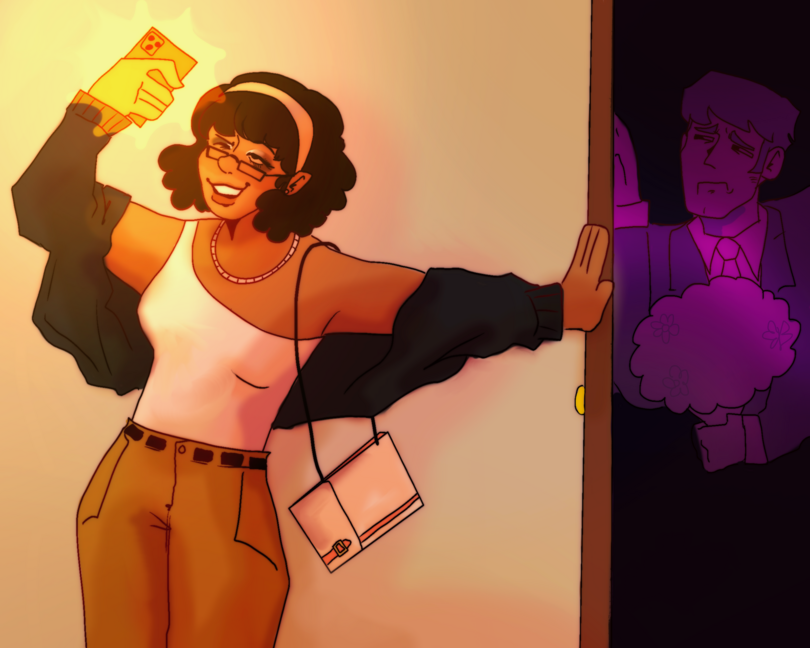Opinion: Anti-boyfriend narrative undermines independence, shames vulnerability

Following a British Vogue article about embarrassment around being in a relationship, our columnist asserts we mustn't let online opinions dictate our choices. It places judgment on those in love instead of contradicting stereotypes. Jay Cronkrite | Contributing Illustrator
Get the latest Syracuse news delivered right to your inbox.
Subscribe to our newsletter here.
When British Vogue published “Is Having a Boyfriend Embarrassing?” I felt a mix of confusion and frustration. I’m not against celebrating singlehood, but the piece fed into a tired narrative that having a boyfriend somehow makes you less interesting, independent or even “lame.”
Being single can look glamorous and empowering, especially as feminism continues to grow in opposition to the current political climate. More women are going against the grain, staying single, developing their careers and prioritizing themselves.
But I also know many single women who are juggling four dating apps and manifesting a husband, and that shouldn’t be viewed as shameful; it’s simply human, and so is being in a relationship.
While Vogue’s purpose may have been to calm tension between the two lifestyles, readers using it to frame one choice as chic and the other as embarrassing completely obstructs what could be a productive conversation around relationships.
The media has a habit of swinging between extremes. For decades, women were told that fulfillment came only through marriage and motherhood, and that singlehood meant you would shamefully end up with six cats and a knitting problem. Now, needing or wanting a partner is embarrassing. Both extremes reduce women to tropes instead of treating them as complex people with varying desires.
While I can recognize Vogue’s attempt to celebrate independence, the reaction online turned its message into something else entirely: a war on men and, further, a judgment on anyone who happens to be in love.
Declaring men the universal enemy doesn’t make women stronger – it just makes the world smaller. It replaces honest social critique with a divisive generalization that distracts from real gendered inequities.
The conversation’s quick turn from empowerment to performance demonstrated that vulnerability itself has become unfashionable; love is something to hide instead of celebrate.
Really, chicness has never been about relationship status but rather authenticity. I’ve seen plenty of people, single, taken, or somewhere in between, who are stylish, confident, and self-assured. I’ve also seen just as many who aren’t.
The women I find most magnetic aren’t defined by whether they’re dating someone. Instead, by the ease with which they inhabit their own lives.
Having an embarrassing boyfriend is embarrassing, just like having a bad haircut or a terrible taste in music might be, but being in love isn’t. Sharing intimacy, joy and connection with another person doesn’t make you a lesser version of yourself. It doesn’t “take hits on a woman’s aura” or ambition. If anything, the right relationship amplifies both.
What’s truly embarrassing is letting the opinions of strangers online dictate how you live. Love has become a kind of performance, where even affection is filtered through the trend cycle of social media. If you post your boyfriend, you’re performing, but if you don’t, you’re ashamed. There’s no winning in a culture that insists on turning everything, even intimacy, into content.
It’s worth mentioning that much of the online men-hating trend that was ignited by this article came from people who didn’t actually read the Vogue piece. This only proves even more so how people blindly follow others’ opinions without actually reading information.
In reality, the article wasn’t about being ashamed of boyfriends at all. It validly explored why some women choose not to share their relationships publicly: privacy, superstition and personal comfort.
What’s truly embarrassing is letting the opinions of strangers online dictate how you live.Ava Swidler, Columnist
One line in the article said, “Boyfriends are out of style until they start acting right.”
Some men deserve to be called out for treating women poorly, but painting all men with that brush erases individuality. It also distracts from the real issues at play: how online discourse can flatten complex conversations about power, identity, and gender into slogans. To generalize is lazy, and to shame women for loving men, even good ones, is unfair.
Ultimately, neither being single nor in love is inherently embarrassing. The idea that a man has such influence on a woman’s personality and others’ perception of her only continues to center him instead of appreciating a woman’s independent values.
The only true embarrassment is allowing your relationship status to define you and allowing others’ opinions to determine how you feel about yourself. We must promote our own individuality while recognizing the danger of turning love into performance.
Ava Swidler is a junior majoring in fine arts. She can be reached at ajswidle@syr.edu.





